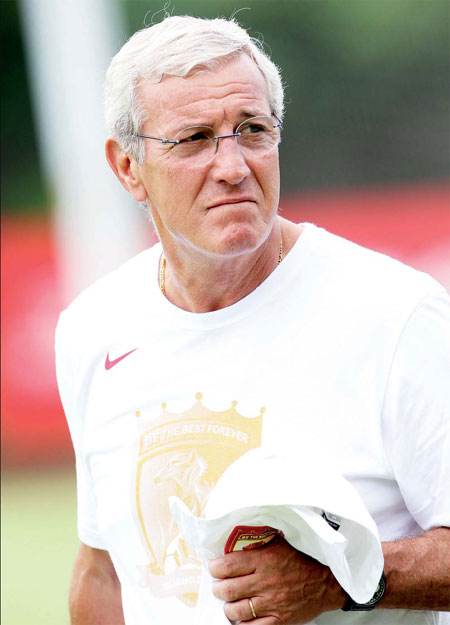Not lost in translation
Updated: 2013-02-01 09:16
By Mariella Radaelli (China Daily)
|
|||||||||||
|
Marcello Lippi is taking Italian football ideas to China's Guangzhou Evergrande team. Provided to China Daily |
Despite the language barrier, Marcello Lippi, coach of Italy's 2006 World Cup winning team, has found success in Guangzhou
The right man, hired at the right time in a team's evolution: Marcello Lippi, manager of Guangzhou Evergrande, is enthusiastic about his Chinese football team. The club, from the southern industrial city of Guangzhou, has won two titles this season, and excitement is still in the air. The former Italian national team head coach, 64, was appointed manager of Guangzhou Evergrande last May on a salary of 10 million euros ($12.74 million) a season.
On the team's improvement, he says, "We have not peaked yet, but we're looking forward to what we can achieve over the coming months." His contract will run until November 2014.
Lippi's burning desire for success goes hand in hand with a love of talking football. I spoke with him during the off-season, when he was back in his native Italy, where he guided the Azzurri to World Cup glory in 2006. The silver-haired Evergrande boss is the only manager to have won both the World Cup and the European Cup, with Juventus a decade earlier.
Lippi's understanding of football has surely benefited Evergrande this season, as he led it to a Chinese Super League title and a Chinese Super Cup title.
"I'm extremely satisfied with the two victories," says Lippi. "That was our mission and I congratulate my players for getting that done. But apart from this, the thing which makes me happiest is the team's growth. My players have improved a lot throughout their daily training. They work hard, and they are honing their skills. This pleases me immensely."
His next target is the AFC Champions League title (the premier Asian club football competition, hosted annually by the Asian Football Confederation).
Were there difficulties in the beginning?
"The difficulties were huge. The most problematic aspect of working with the team was the difficulty and stress of communication," he says. Lippi is famous for liking to interact with his players.
"I want for them to see what is coming from my mind, and my heart," he says.
How does he feel about his experience in China, both professionally and socially?
"I am very focused on what I am doing. I bring Italian football ideas to the team. I share my way of working and my philosophy, and so far the results have been extremely positive. The players react very well to the Italian method," he says.
Has he established new rules regarding free time and eating habits? He says laughing: "If you want to know, I haven't introduced the Mediterranean diet, as I discovered that Chinese cuisine can be quite healthy. Yes, it can be light, with little oil.
"You can have simple dishes, very delicate in flavor, really exquisite. Therefore, I want my players to stick to their food habits.
"There's no reason to change them. Even I have benefited from it these months. As you well know, we Italians are often very biased where food is concerned. Chinese do not only eat cockroaches and snakes, but a wide range of food. However, you can always jump in a car and find an authentic Italian restaurant."
Related Stories
Young coach full of praise for Lippi 2012-10-27 07:57
Lippi denies Drogba move 2012-10-16 13:41
Lippi the big man on campus 2012-10-10 06:49
Lippi confirms Conca stay 2012-07-15 07:30
Lippi goes on offensive over team's defensive play 2012-06-01 07:54
Lippi leads Guangzhou into Asian quarters 2012-05-31 07:28
Today's Top News
List of approved GM food clarified
ID checks for express deliveries in Guangdong
Govt to expand elderly care
University asks freshmen to sign suicide disclaimer
Tibet gears up for new climbing season
Media asked to promote Sino-Indian ties
Shots fired at Washington Navy Yard
Minimum growth rate set at 7%
Hot Topics
Lunar probe , China growth forecasts, Emission rules get tougher, China seen through 'colored lens', International board,
Editor's Picks

|

|

|

|

|

|






